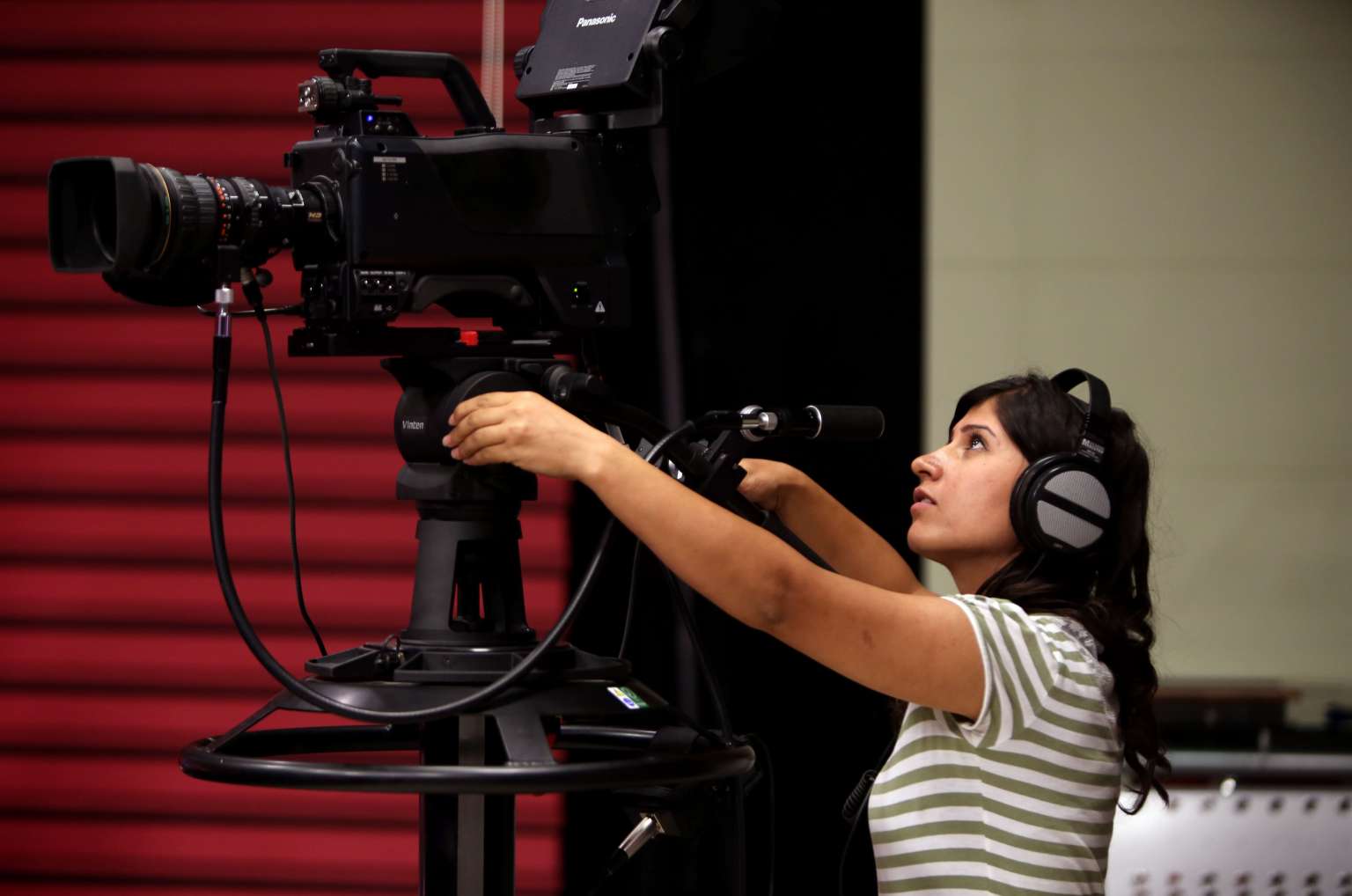Long taboo, Kurdish culture sees renaissance in Syria
Sign up now: Get ST's newsletters delivered to your inbox

A camerawoman from Ronahi TV, the only Syrian satellite channel that broadcasts in Kurdish, works at the studio in Qamishli, a Kurdish-majority city in Syria's northeastern Hasakeh province, on July 14.
PHOTO: AFP
Follow topic:
QAMISHLI, Syria (AFP) - Driving through parts of northeastern Syria, Vian Khouzy points proudly to dozens of new road signs printed in Kurdish.
"It's a dream come true," he says.
The 33-year old works as a taxi driver in areas controlled by the autonomous Kurdish administration in northern and northeastern Syria.
Before the beginning of Syria's war in 2011, "just being Kurdish was enough for the regime to arrest you and put you in prison", Khouzy says.
Now he drives by posters of Abdullah Ocalan, the Kurdish leader jailed in Turkey. It was "impossible to see any Kurdish symbols" in the past, he says.
Kurds make up more than 10 per cent of Syria's population, concentrated in the northeastern region of Hasakeh and parts of Aleppo and Raqa provinces.
For decades, Syrian Kurds were severely marginalised. Many were not given Syrian nationality and they were banned from speaking their language or celebrating Kurdish traditions, like Nowruz, the new year's festival marked every spring.
In 2004, anti-regime demonstrations in the Kurdish-majority city of Qamishli in northeastern Syria were brutally repressed.
But it all began to change in July 2012, when regime troops strained by the country's civil war withdrew from Kurdish-majority areas in the northeast.
A year later the Democratic Union Party (PYD), the most prominent representative of Syria's Kurds, announced an autonomous administrative system in three "cantons", sparking a Kurdish renaissance.
The PYD's armed wing, the People's Protection Units (YPG), protects Kurdish areas and has been a leading force in the fight against the jihadist Islamic State group.
Now, at the entrance to Qamishli, a large road sign welcomes visitors in both Arabic and Kurdish - something unimaginable to its residents just four years ago.
"Everyone can speak Kurdish, but a very small minority can read and write, since we were banned from learning the language," says Khouzy - who can barely read a few words.
In a language centre in the town of Amuda, roughly 30 kilometres west of Qamishli, Mazhar Sheikho is beaming.
Notebook and pen in hand, he says he's realising his "childhood dream".
"I am proud to learn my mother tongue at an academic level," says the 45-year old, stepping out of a grammar exam at the centre.
The demand for Kurdish language classes was so high that the centre was forced to split students into morning and evening sessions.
"We opened the centre in 2011. It was very dangerous because at that time this area wasn't controlled by Kurdish forces," says Sardar, an employee at the centre.
"We didn't have much, but we wanted to open it at all costs." Since then some 50 similar language centres have opened in the "Jazire" canton in Hasakeh province.
"We used to learn Kurdish grammar in secret," says Delsha, a woman in her 50s carrying a black briefcase.
"I'm here today to learn it seriously, and to teach it to my children and grandchildren." Syria's Kurdish population has strived to remain neutral towards the embattled regime of President Bashar al-Assad, which is fighting a multi-front war against different rebel groups.
To win their favour, Assad granted tens of thousands of Kurds nationality in the early days of the anti-regime revolt.
The University of Damascus also added Kurdish to its language department last year.
In the popular market in Amuda, considered the political hub of the Kurdish autonomous administration, storefronts are packed with traditional Kurdish costumes and flags.
"In the past, selling a Kurdish flag was more difficult than selling drugs," says shop owner Ahmad Bozo.
"We noticed a huge demand for traditional Kurdish clothes since 2012, after the gradual withdrawal of the regime from the city," he says.
"Today, we can sell without restrictions." Syrian Kurds are also expressing their newfound cultural freedoms on the airwaves.
Ronahi TV was founded at the end of 2012 in Amuda and is the only Syrian satellite channel that broadcasts in Kurdish.
"We have 50 employees, including Arabs. Over 24 hours we present more than 25 political, cultural, and social programs in Kurdish and Arabic," says Zalal Binisi, the channel's director.
"We try to broadcast the Kurdish voice to the world." In one of the station's three studios, journalist Rudi Mohammad Amin prepares for his weekly discussion on social problems in the autonomous areas, donning traditional Kurdish wear of large, loose black pants and a blue shirt covered with a vest.
"I cannot describe my joy as I speak to the world in my mother tongue," the young man says. "The time has come when we can yell without fear."

